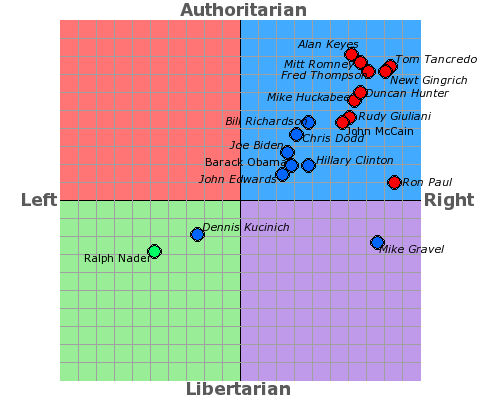nimh wrote:Yeah, and interesting too is that everyone, including Republicans, see Huckabee as the most conservative of the presidential candidates.
This despite the barrage of attacks by the likes of Rush Limbaugh, and the Club for Growth, and his rivals in the race of course, making him out to be some kind of tax-raising economic socialist.
Perhaps an indication of how the "moral" (religious/secular) axis overrides the economic one in America when it comes to defining left and right...
Yeah, that's key to understanding American politics.
Church overrides party (as I have stated elsewhere)... even we must acknowledge that churches of the same denomination can be very different in the US.
Yeah, well, we talked about that :wink:
Church overrides class is what you said then, I think. But I think we settled on income, if not class, playing just as major a role...
nimh wrote:Yeah, well, we talked about that :wink:
Church overrides class is what you said then, I think. But I think we settled on income, if not class, playing just as major a role...
Sure.
We must remember that the US as a whole is moving towards a post-modern society at a slower pace than Western European nations (or, to put it in Trotskyte language, in an "uneven and combined" way). A huge part of American society springs to traditional (and religious) values and authority rather than to rational/secular values and authority (which would be typical of Northern Europe).
fbaezer wrote:nimh wrote:Yeah, well, we talked about that :wink:
Church overrides class is what you said then, I think. But I think we settled on income, if not class, playing just as major a role...
Sure.
We must remember that the US as a whole is moving towards a post-modern society at a slower pace than Western European nations (or, to put it in Trotskyte language, in an "uneven and combined" way). A huge part of American society springs to traditional (and religious) values and authority rather than to rational/secular values and authority (which would be typical of Northern Europe).
Where does Mexico sit on that, Fbaezer?
Very near the USA, dlowan.
fbaezer wrote:Very near the USA, dlowan.
Interesting. I would have guessed that, but could not speak confidently for it.
Perhaps in the march towards "a better post modern world" it is Western Europe that is the odd man out.
fbaezer wrote:dlowan wrote:Where does Mexico sit on that, Fbaezer?
Very near the USA, dlowan.
But does it sit as close to the USA as Canada, fbaezer?
Canada's much more like Western Europe than the U.S. when it comes to the impact of religion on politics. Canadians really don't go for the religion/politics attachment.
According to the poll I cited (somewhere else, I think)
Mexico is very slightly more survival oriented and traditionally minded than the USA.
Canada is very slightly less survival oriented and traditionally minded than the USA.
The three Nafta partners form a sort of a cultural cluster.
The cultural neighbors:
Chile and Argentina lie next to Mexico, somewhat more to the "survival and traditional" side of the spectrum; Great Britain and Spain lie next to Canada, to the "post-modern and secular/rational" side; Ireland lies on the "post-modern", but "traditional". There is no data for Australia.
Western Europe:
Germany is not that "post-modern" but it's farthest away as the most "secular/rational" country; the Netherlands and Scandinavia rank high both in "post-modern" and "secular/rational" values. Belgium, France and Italy lay somewhat lower (but over Great Britain & Spain).
When it comes to politics, I fail to see any Western country that pays as much attention to religion and religion-based values as the US.
BUT...
Blair did not become a Catholic until he left Downing Street
Christian Democratic parties in Europe do press about belonging to a certain church (not so much about issues as in the US, but still)
Family religious tradition plays an important role (or used to, at least until the late 80s) in party identification in Belgium.
In Mexico:
-All candidates of the conservative party are Catholics. But if they talk about God or religion-based values, they lose points in the polls.
-No candidate of any other party would like to be seen at church.
-Allegations about (former populist candidate) López Obrador being a Protestant had absolutely no electoral effect. When asked on national TV about his religion, he stated: "I'm a believer". Moderators tought it would be of bad taste to keep going.
Separation of Church ("religious groupings", as they're officially named) & State is very highly regarded.
Until 1992, priests, rabbis, nuns, etc ("cult ministers", in the official language) were not allowed to vote. They're not allowed to be candidates. Cult ministers are forbidden to talk about politics in the temples (but they manage to, with subtle words: when words are not so subtle, inmediately some party presses charges against them).
fbaezer,
Interesting commentary & classification - thanks. Any categories for Brazil?
georgeob1 wrote:fbaezer,
Interesting commentary & classification - thanks. Any categories for Brazil?
Brazil is in the neighborhood of Chile and Argentina, but more traditional and more survival oriented. Poland, still more survival oriented is also nearby on the map.
Still Brazil's quite far away from India, Kenya or Nigeria, who are the countries more guided by traditional values among those studied.
I would imagine that many Islamic nations would be in the neighborhood of Nigeria, or even more driven by tradition.
I was quite taken with this chart from the political compass.
(thanks to Dag for leading me there through facebook)
http://www.politicalcompass.org/
Apparently, Kucinich and Gravel would have been my only real choices if I was an American voter.

Ayn Rand sat between Clinton and Paul, and slightly below them.
Dead bang on Ron Paul. Now why doesn't THAT surprise me?
Halfback